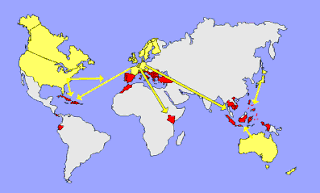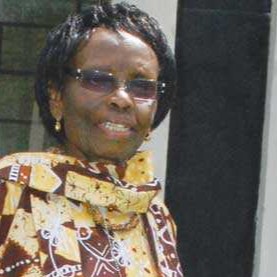
The AIDS epidemic, caused by HIV, found its way to the United States between the 1970s and 1980s, but was first noticed after doctors discovered clusters of Kaposi's sarcoma and pneumocystis pneumonia in homosexual men in Los Angeles, New York City, and San Francisco in 1981. Treatment of HIV/AIDS is primarily via the use of multiple antiretroviral drugs, and education programs to help people avoid infection.

HIV/AIDS originated in Africa during early 20th century and is a major public health concern and cause of death in many African countries. AIDS rates varies significantly between countries, though the majority of cases are concentrated in Southern Africa. Although the continent is home to about 15.2 percent of the world's population, more than two-thirds of the total infected worldwide – some 35 million people – were Africans, of whom 15 million have already died. Eastern and Southern Africa alone accounted for an estimate of 60 percent of all people living with HIV and 70 percent of all AIDS deaths in 2011. The countries of Eastern and Southern Africa are most affected, AIDS has raised death rates and lowered life expectancy among adults between the ages of 20 and 49 by about twenty years. Furthermore, the life expectancy in many parts of Africa is declining, largely as a result of the HIV/AIDS epidemic with life-expectancy in some countries reaching as low as thirty-nine years.

Marianismo is a Spanish American term that describes an ideal of true femininity with characteristics derived from the devotional cult of St. Mary of Guadalupe, a central figure of Roman Catholicism in Mexico. It defines standards for the female gender role in Hispanic American folk cultures, and is strictly intertwined with machismo and Roman Catholicism.
A syndemic or synergistic epidemic is the aggregation of two or more concurrent or sequential epidemics or disease clusters in a population with biological interactions, which exacerbate the prognosis and burden of disease. The term was developed by Merrill Singer in the early 1990s to call attention to the synergistic nature of the health and social problems facing the poor and underserved. Syndemics develop under health disparity, caused by poverty, stress, or structural violence and are studied by epidemiologists and medical anthropologists concerned with public health, community health and the effects of social conditions on health.
Merrill Singer is a medical anthropologist and professor emeritus in Anthropology at The University of Connecticut and in Community Medicine at The University of Connecticut Health Center. He is best known for his research on substance abuse, HIV/AIDS, syndemics, health disparities, and minority health.

Female sex tourism is sex tourism by women who travel intending to engage in sexual activities with one or more locals, including male sex workers and female sex workers. Female sex tourists may seek aspects of the sexual relationship not typically shared by male sex tourists, such as perceived romance and intimacy. The incidence of female sex tourism is relatively much lower than male sex tourism, so the number of female sex tourists makes it somewhat difficult to research this phenomenon.
Human Organization is the peer-reviewed research journal of the Society for Applied Anthropology. Published quarterly since 1941, it is the second-longest continuously published journal in cultural anthropology in the United States. Its primary objective is to analyze practical human problems through the application of anthropological theory and data. The journal regularly features articles on human rights, public health and medical care, and indigenous knowledge and management of natural resources.
Nancy Scheper-Hughes is an anthropologist, educator and author. She is the Chancellor’s Professor Emerita of Anthropology and the director and co-founder of the PhD program in Critical Medical Anthropology at the University of California, Berkeley. She is known for her writing on the anthropology of the body, hunger, illness, medicine, motherhood, psychiatry, psychosis, social suffering, violence and genocide, death squads, and human trafficking.
Prostitution in Costa Rica is legal. Costa Rica's legal system is based on Roman law rather than common law, and so for prostitution to be illegal it would have to be explicitly stated as such in a penal code, and it is not. Nevertheless, many of the activities surrounding it are illegal, as the law forbids promoting or facilitating the prostitution of another, and therefore pimping, brothels, or prostitution rings are illegal. Prostitution is common and is practiced openly throughout the country, particularly in popular tourism destinations.
Pamela Irene Erickson is a medical anthropologist. The holder of both a Dr.P.H and a PhD, she is Professor of Anthropology and Community Medicine at the University of Connecticut, Storrs. A former editor of the scholarly journal Medical Anthropology Quarterly, much of her own research has focused on reproductive health among Hispanic girls and young women. Prominent among the publications resulting from these investigations is her 1998 book, Latina Adolescent Childbearing in East Los Angeles. Erickson has also done fieldwork in Nepal, the Philippines, India, and Ecuador and this work is reflected in her 2008 textbook, Ethnomedicine. A Fellow of the American Anthropological Association and the Society for Applied Anthropology, Erickson has also served on the Governing Council of the Family and Reproductive Health Section of the American Public Health Association. Additionally, she is co-editor, with Merrill Singer of the book series Advances in Critical Medical Anthropology with Routledge.

Perry N. Halkitis is an American of Greek ancestry public health psychologist and applied statistician known for his research on the health of LGBT populations with an emphasis on HIV/AIDS, substance use, and mental health. Perry is Dean and Professor of Biostatistics, Health Education, and Behavioral Science at the Rutgers School of Public Health.
Edward C. (Ted) Green is an American medical anthropologist working in public health and development. He was a senior research scientist at the Harvard School of Public Health and served as senior research scientist at the Harvard Center for Population and Development Studies for eight years, the last three years as director of the AIDS Prevention Project. He was later affiliated with the Department of Population and Reproductive Health at Johns Hopkins University (2011–14) and the George Washington University as research professor. He was appointed to serve as a member of the Presidential Advisory Council on HIV/AIDS (2003–2007), and served on the Office of AIDS Research Advisory Council for the National Institutes of Health (2003–2006). Green serves on the board of AIDS.org and the Bonobo Conservation Initiative. and Medical Care Development.
Since reports of emergence and spread of the human immunodeficiency virus (HIV) in the United States between the 1970s and 1980s, the HIV/AIDS epidemic has frequently been linked to gay, bisexual, and other men who have sex with men (MSM) by epidemiologists and medical professionals. It was first noticed after doctors discovered clusters of Kaposi's sarcoma and pneumocystis pneumonia in homosexual men in Los Angeles, New York City, and San Francisco in 1981. The first official report on the virus was published by the Center for Disease Control (CDC) on June 5, 1981 and detailed the cases of five young gay men who were hospitalized with serious infections. A month later, The New York Times reported that 41 homosexuals had been diagnosed with Kaposi's sarcoma, and eight had died less than 24 months after the diagnosis was made.

Nancy Tang Chang, née Tang Nanshan, is a biochemist who cofounded Tanox in 1986 to address medical needs in the areas of allergy, asthma, inflammation and diseases affecting the human immune system. Tanox took an innovative approach in developing an asthma drug that focused on the allergy-related basis of asthma, Xolair. In June 2003, the U.S. Food and Drug Administration (FDA) approved Xolair, the first biotech product cleared for treating those with asthma related to allergies. Tanox was also active in the development of TNX-355, an antibody for the treatment of HIV/AIDS. In 2007, Tanox was sold to Genentech for $919 million. Dr. Chang grew Tanox from an idea to a substantial publicly traded company, doing innovative science. Following her success with Tanox, she has become an angel investor in health-care entrepreneurships and performs philanthropic work in community health-education projects.
Jean J. Schensul is a medical anthropologist and senior scientist at The Institute for Community Research, in Hartford, Connecticut. Dr. Schensul is most notable for her research on HIV/AIDS prevention and other health-related research in the United States, as well as her extensive writing on ethnographic research methods. She has made notable contributions to the field of applied anthropology, with her work on structural interventions to health disparities leading to the development of new organizations, community research partnerships, and community/university associations. Schensul’s work has been dedicated to community-based research on topics such as senior health, education, and substance abuse, among others.
Suniti Solomon was an Indian physician and microbiologist who pioneered AIDS research and prevention in India after having diagnosed the first Indian AIDS cases among the Chennai sex workers in 1986 along with her student Sellappan Nirmala. She founded the Y R Gaitonde Centre for AIDS Research and Education in Chennai. The Indian government conferred the National Women Bio-scientist Award on her. On 25 January 2017, the Government of India awarded her the Padma Shri for medicine for her contributions towards diagnosis and treatment of HIV.
Wendee M. Wechsberg is an American social science researcher. Wechsberg's research focuses on developing and testing the efficacy of HIV prevention interventions among key populations of substance abusers globally. She is a recognized expert in the fields of substance abuse, gender inequality, and HIV. She developed the Women's CoOp intervention, a woman-focused behavioral HIV intervention that incorporates gender- and culture-specific skills training. Wechsberg is a Principal Researcher and Director of the Substance Use, Gender, and Applied Research (SUGAR) Program at RTI International and Director of the RTI Global Gender Center. She is also adjunct professor at the University of North Carolina at Chapel Hill (UNC) Gillings School of Global Public Health, Adjunct Professor of Psychology at North Carolina State University (NCSU), and adjunct professor in Psychiatry and Behavioral Sciences at Duke University School of Medicine.
Yolanda Serrano was a Puerto Rican-American drug counselor and HIV/AIDS activist. She received the National Organization for Women's Woman of the Year Award and was featured in Ms. magazine as one of the 1988 Women of the Year in 1988.

Elizabeth Ngugi was a Kenyan Professor of Community Health at the University of Nairobi, and a nurse by trade. Her major contributions to her university's program was her research and work with local prostitutes to prevent HIV/AIDS transmission. Ngugi is described as the first Kenyan nurse to become a professor.
Ligia Peralta is a Dominican-born doctor of pediatrics and adolescent medicine in Maryland. Her research focuses on HIV and the transmission of HIV in adolescents, specifically those from under-served communities.






